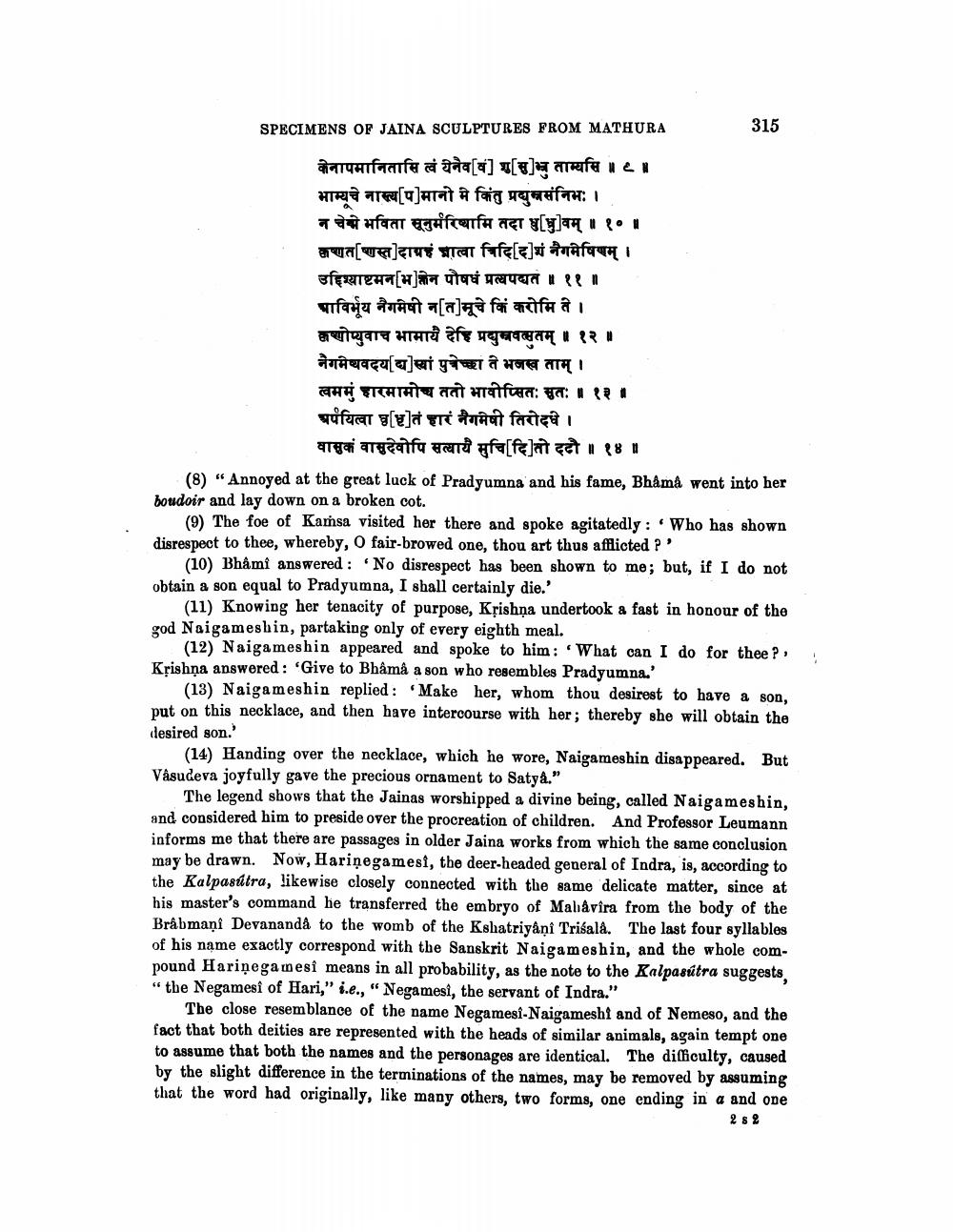________________
SPECIMENS OF JAINA SCULPTURES FROM MATHURA
केनापमानितासि त्वं येनैव [वं] व[सु]भ्नु ताम्यसि ॥ ८ ॥ भाग्यचे नाव[प]मानो मे किंतु प्रयुखसंनिभाः । न चेो भविता सूनुर्मरिष्यामि तदा धु[धु]वम् ॥ १० ॥ कृष्णत[ष्णस्त]दाग्रहं ज्ञात्वा त्रिदि[द]शं नैगमेषिणम् । उहिष्टमन [भ] क्रेन पोषयं प्रत्यपद्यत । ११।
विर्भूय नैगमेषी न [त]मूचे किं करोमि ते । बच्चोम्युवाच भामारी देखि प्रयुतम् ॥ १२ ॥ Antwren(u)wi güver & wwer arq त्वममुं हारमामोच्च ततो भावीप्सितः सुतः ॥ १२ ॥ wifery Aniût færiteit i
वासुदेवोपि सत्यायें सुचि[दितो ददौ । १४ ॥
315
या
(8) "Annoyed at the great luck of Pradyumna and his fame, Bhâmâ went into her boudoir and lay down on a broken cot.
(9) The foe of Kamsa visited her there and spoke agitatedly: Who has shown disrespect to thee, whereby, O fair-browed one, thou art thus afflicted ? '
(10) Bhâmî answered: No disrespect has been shown to me; but, if I do not obtain a son equal to Pradyumna, I shall certainly die.'
(11) Knowing her tenacity of purpose, Krishna undertook a fast in honour of the god Naigameshin, partaking only of every eighth meal.
(12) Naigameshin appeared and spoke to him: What can I do for thee?, Krishna answered: 'Give to Bhâmâ a son who resembles Pradyumna.'
(13) Naigameshin replied: 'Make her, whom thou desirest to have a son, put on this necklace, and then have intercourse with her; thereby she will obtain the desired son.'
(14) Handing over the necklace, which he wore, Naigameshin disappeared. But Vasudeva joyfully gave the precious ornament to Satya."
The legend shows that the Jainas worshipped a divine being, called Naigameshin, and considered him to preside over the procreation of children. And Professor Leumann informs me that there are passages in older Jaina works from which the same conclusion may be drawn. Now, Harinegamest, the deer-headed general of Indra, is, according to the Kalpasútra, likewise closely connected with the same delicate matter, since at his master's command he transferred the embryo of Maliâvira from the body of the Bråbmani Devanandâ to the womb of the Kshatriyânî Triśalâ. The last four syllables of his name exactly correspond with the Sanskrit Naigameshin, and the whole compound Harinega mesî means in all probability, as the note to the Kalpasútra suggests, "the Negamesi of Hari," i.e., " Negamesi, the servant of Indra."
The close resemblance of the name Negamesi-Naigameshi and of Nemeso, and the fact that both deities are represented with the heads of similar animals, again tempt one to assume that both the names and the personages are identical. The difficulty, caused by the slight difference in the terminations of the names, may be removed by assuming that the word had originally, like many others, two forms, one ending in a and one
282
1




